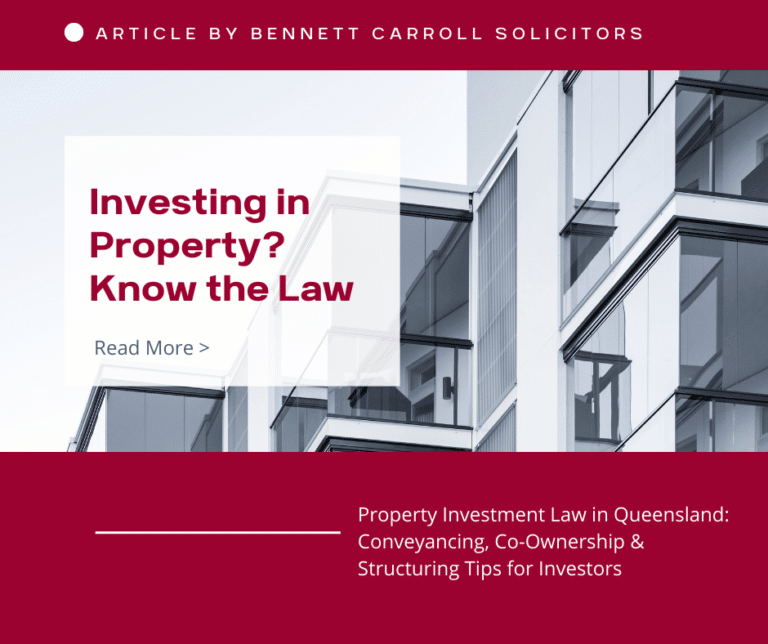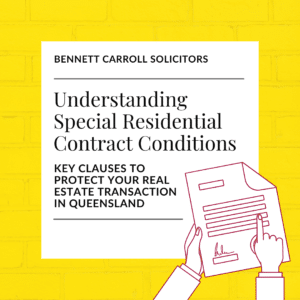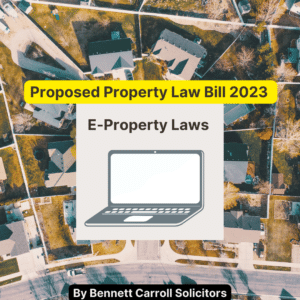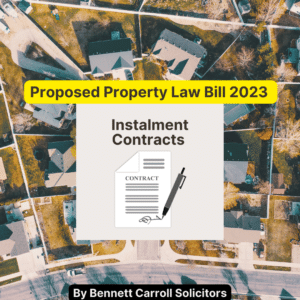Investing in property in Queensland can be financially rewarding, but it also requires careful navigation of property investment law, including conveyancing, co-ownership agreements, and structuring strategies. Understanding your legal obligations and choosing the right setup can help investors protect their assets, minimise tax liabilities, and avoid costly disputes. This guide explores the key legal aspects of property law for investors, including conveyancing in Queensland, co-ownership arrangements, and how to structure your investment property for long-term success.
Understanding Conveyancing for Property Investors
Conveyancing is the legal process of transferring property ownership from a seller to a buyer. For property investors, key considerations include:
- Contract Reviews: Ensuring the contract includes necessary clauses, such as due diligence and finance conditions.
- Stamp Duty Implications: Understanding how tax obligations differ for investors compared to owner-occupiers.
- Settlement Process: Ensuring a smooth transition and compliance with Queensland property laws.
Co-Ownership Agreements: Avoiding Legal Pitfalls
If you’re purchasing property with a business partner, family member, or investor group, a co-ownership agreement is essential. This agreement outlines:
- Ownership Shares: Clearly defining each party’s percentage of ownership.
- Decision-Making Processes: Establishing how disputes, property sales, or additional investments will be handled.
- Exit Strategy: Detailing how a co-owner can sell or transfer their share of the property.
See also: Co-Ownership Agreements in Queensland: A Complete Guide to Shared Property Ownership
Structuring Your Investment Property for Maximum Protection
Choosing the right structure for property investment can impact liability, tax benefits, and succession planning. Common structures include:
- Individual Ownership: Simple but exposes personal assets to risk.
- Company-Owned Property: Provides limited liability but comes with additional regulations and tax implications.
- Trust Structures (e.g., Family Trusts, Unit Trusts, SMSFs): Often used for asset protection and tax benefits, but must be properly established to comply with regulations.
Key Legal Risks for Property Investors
- Zoning & Planning Restrictions: Ensure the property complies with local zoning laws before purchase.
- Tenancy Laws: Understanding obligations under the Residential Tenancies and Rooming Accommodation Act 2008 (Qld).
- Loan & Finance Conditions: Avoiding hidden fees and legal issues in loan agreements.
Secure Your Property Investment with Expert Legal Advice
Whether you’re a first-time investor or managing a growing property portfolio, expert legal advice is crucial for navigating the complexities of property investment in Queensland. From reviewing contracts and structuring ownership to avoiding legal risks, working with experienced property lawyers can give you peace of mind.
At Bennett Carroll Solicitors, our experienced property law team assists investors across Brisbane, the Gold Coast, Ipswich, and the Sunshine Coast with tailored legal solutions in conveyancing, co-ownership agreements, and investment structuring.
Further Resources for Property Investors:
Expand your understanding with these helpful resources:
Understanding Co-Ownership Agreements – Article by Bennett Carroll Solicitors
Conveyancing with Bennett Carroll Solicitors
Queensland Government – Stamp Duty for Investors
Queensland Residential Tenancies Authority – Investor Rights







